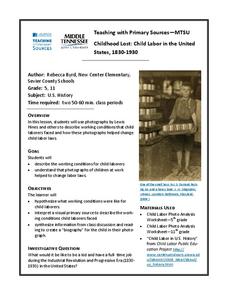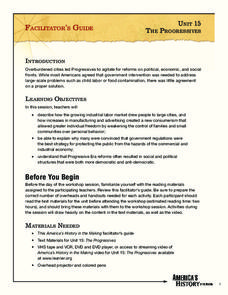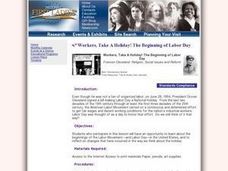Curated OER
Childhood Lost: Child Labor in the United States, 1830-1930
Working in groups, middle and high schoolers describe and discuss photographs depicting working conditions experienced by child laborers in the 19th century. They then write a persuasive paragraph supporting an amendment to regulate the...
Library of Congress
Child Labor in America
Students investigate child labor during the Great Depression. In this US policy activity, students evaluate multiple layers of the social, economic, and political affects of policy during the Great Depression. Students will engage in 5...
Learning for Justice
The Color of Law: Winners and Losers in the Job Market
The second lesson in "The Color of Law" shows how government policies supported economic inequality. Scholars read additional excerpts and respond to text-dependent questions from "The Color of Law" text, examine primary source documents...
Center for History Education
The Triangle Shirtwaist Factory Fire: Is Anyone to be Punished for This?
The stories of bodies falling to the pavement and girls dying in their seats echo to the present day. The New York City Triangle Shirtwaist Factory fire—which killed 147 people, mostly young women and girls—galvanized the labor movement...
DocsTeach
Lewis Hine Shedding Light on Child Labor through Photographs
The Industrial Revolution: long hours, low pay, and unsafe conditions. An eye-opening activity explores the darker side of industry and exposes the realities of child labor with photos. Scholars view four photos from the famous...
Center for History Education
Methods of Reform: The Lowell Mill Girls
Although the girls and women who worked in the Lowell Mills are not often seen this way, they are the forbearers of the American labor movement. Pupils examine primary sources, including testimony about life at Lowell and labor laws, as...
Smithsonian Institution
Strength in Solidarity: Coalition of Immokalee Workers and the Campaign for Fair Food
Not all food is created equal. The instructional activity dives into the world of migrant farm workers to show their struggles to earn livable wages and better working conditions. Academics learn why the Coalition of Immokalee Workers...
DocsTeach
Analyzing Photographs of the Triangle Shirtwaist Factory Fire
While a catalyst for the labor movement, 146 people lost their lives in the Triangle Shirtwaist Factory Fire in 1913. A series of photographs of the aftermath of the tragedy help young historians consider the impact of the fire. The...
DocsTeach
Analyzing a Child Labor Photograph
Sometimes images tell shocking stories. Individuals examine a Lewis Hines picture of children packing beans and consider the impact working in a factory had on their young lives. A series of prompts emailed to the teacher helps them...
DocsTeach
Confronting Work Place Discrimination on the World War II Home Front
Before the Civil Rights Movement was in full swing, FDR's executive order helped promote fair employment. The activity uses primary documents to explore FDR's executive order to help minorities gain equal employment and pay during the...
Teaching Tolerance
Slavery as a Form of Racialized Social Control
An engaging lesson delves into the effects of slavery on society. Young historians read text excerpts, complete handouts, and participate in group discussion to understand how slavery was a means to control society and establish a racial...
National Woman's History Museum
The Triangle Shirtwaist Fire
On March 25, 1911, 146 garment workers died in the Triangle Shirtwaist Factory fire. Class members use primary source documents to research the tragedy and how it lead to the creation of labor unions and new labor laws. As an exit...
PBS
The Supreme Court: Liberty of Contract
How did the Supreme Court apply the Fourteenth Amendment to cases involving working people? Learn all about labor rights in a resource that focuses on the liberty of contract and protections for workers. Scholars complete handouts that...
Annenberg Foundation
The Progressives
The Progressive Era brought about a word that often leads to turmoil—change! Learners research the late 1800s in American history to uncover societal issues gripping the nation back in the day. The 15th lesson of a 22-part series...
California Department of Education
Hazards in the Workplace
Safety first! Safety first! A short video and a PowerPoint presentation introduce job seekers to child labor law awareness, safety standards, and ways to reduce workplace injuries. Class members first take a short workplace...
University of Wisconsin
Why Did the Triangle Fire Occur?
An investigation of the 1911 New York City Triangle Shirtwaist Factory fire leads class members to examine primary and secondary source materials related to the event and apply what they learn about the working conditions at the time to...
Pulitzer Center
China's Rising Labor Movement
Young historians will explore the complex causes and effects of industrialization in China by perusing the numerous articles included in this webpage. Throughout the resource, there are many writing and discussion prompts to help direct...
Curated OER
Lord Shaftesbury
One of the negative effects of the Industrial Revolution was the advent of child labor. Discover the good deeds and law making powers held by Lord Shaftesbury. Each slide describes his life and his contributions to child welfare,...
Curated OER
The Progressive Movement
While the Progressives never formed a political party they did develop an ideology. Provide viewers with an interesting, yet challenging presentation on the Progressive Movement that introduces key individuals and highlights key events...
National First Ladies' Library
Workers, Take a Holiday! the Beginning of Labor Day
When your upper elementary class returns in the fall, have them identify and define the beginnings of the labor movement and Labor Day in the United States. They thoughtfully reflect on changes that have occurred in the way we think...
Curated OER
All Work and No Pay Makes Workers Angry
Students examine and react to a current cost-cutting dilemma faced by store managers. They then study the rights of worker and employers, and draft their findings in chapters of a book examining labor laws in the United States.
Curated OER
Youth and Society
Students discuss and research what children's lives throughout the world are like and consider factors that influence living conditions. Students compare child labor laws for the U.S. and other countries and identify ideal human rights.
Other
Equal Employment Opportunities and Affirmative Action
This St. Norbert College offers a research presentation that provides brief overviews of the equal employment laws, executive order 11246, and hiring processes.
US Department of Labor
U.s. Department of Labor: Youth and Labor: Resources for Educators
Are you interested in learning about youth employment rules? This easy-to-use site has all of the youth and labor resources organized by topic with lots of resources for educators and curriculum development.

























